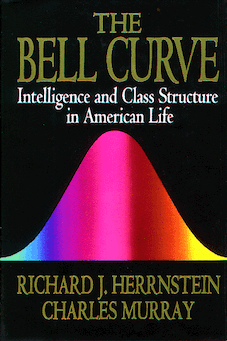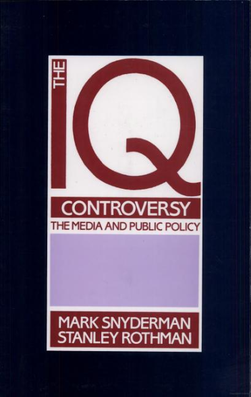Publications
| | This section is empty. You can help by adding to it. (July 2010) |
Philip Anthony "Tony" Vernon (born 1950) is a Canadian psychologist. He is a professor and intelligence researcher. Vernon is the former editor-in-chief of the scientific journal Personality and Individual Differences and formerly sat on the editorial board of Intelligence [1] [2] and the board of directors of the International Society for the Study of Individual Differences (ISSID).
Vernon was born in England. His father Philip E. Vernon also studied intellectual abilities. [3]
Vernon has taught at University of Western Ontario.
He received a grant from Pioneer Fund. According to their website, "he and his collaborators at the University of Western Ontario used state-of-the-art Magnetic Resonance Imaging (MRI) techniques and found that IQ scores are related to brain size. In one study, they reported the results for 40 adult females for whom the correlation between brain size and IQ was 0.40. In a subsequent study, this time of 68 adult males, they again found a 0.40 correlation between brain volume and IQ. They also showed that external head size measures such as head length, head width, and head circumference also correlated with IQ scores, but only about 0.20, and that brain size correlated more highly with the g component of IQ scores." [4]
Among other areas, Vernon has researched race and intelligence. In 1994 he was one of 52 signatories on "Mainstream Science on Intelligence," [5] an editorial written by Linda Gottfredson and published in Intelligence in 1997.
| | This section is empty. You can help by adding to it. (July 2010) |

Arthur Robert Jensen was an American psychologist and writer. He was a professor of educational psychology at the University of California, Berkeley. Jensen was known for his work in psychometrics and differential psychology, the study of how and why individuals differ behaviorally from one another.
John Philippe Rushton was a Canadian psychologist and author. He taught at the University of Western Ontario until the early 1990s, and became known to the general public during the 1980s and 1990s for research on race and intelligence, race and crime, and other purported racial correlations.
Discussions of race and intelligence – specifically regarding claims of differences in intelligence along racial lines – have appeared in both popular science and academic research since the modern concept of race was first introduced. With the inception of IQ testing in the early 20th century, differences in average test performance between racial groups were observed, though these differences have fluctuated and in many cases steadily decreased over time. Complicating the issue, modern science has concluded that race is a socially constructed phenomenon rather than a biological reality, and there exist various conflicting definitions of intelligence. In particular, the validity of IQ testing as a metric for human intelligence is disputed. Today, the scientific consensus is that genetics does not explain differences in IQ test performance between groups, and that observed differences are environmental in origin.

The Bell Curve: Intelligence and Class Structure in American Life is a 1994 book by psychologist Richard J. Herrnstein and political scientist Charles Murray, in which the authors argue that human intelligence is substantially influenced by both inherited and environmental factors and that it is a better predictor of many personal outcomes, including financial income, job performance, birth out of wedlock, and involvement in crime than are an individual's parental socioeconomic status. They also argue that those with high intelligence, the "cognitive elite", are becoming separated from those of average and below-average intelligence, and that this separation is a source of social division within the United States.

Hans Jürgen Eysenck was a German-born British psychologist. He is best remembered for his work on intelligence and personality, although he worked on other issues in psychology. At the time of his death, Eysenck was the most frequently cited living psychologist in the peer-reviewed scientific journal literature.
The g factor is a construct developed in psychometric investigations of cognitive abilities and human intelligence. It is a variable that summarizes positive correlations among different cognitive tasks, reflecting the fact that an individual's performance on one type of cognitive task tends to be comparable to that person's performance on other kinds of cognitive tasks. The g factor typically accounts for 40 to 50 percent of the between-individual performance differences on a given cognitive test, and composite scores based on many tests are frequently regarded as estimates of individuals' standing on the g factor. The terms IQ, general intelligence, general cognitive ability, general mental ability, and simply intelligence are often used interchangeably to refer to this common core shared by cognitive tests. However, the g factor itself is a mathematical construct indicating the level of observed correlation between cognitive tasks. The measured value of this construct depends on the cognitive tasks that are used, and little is known about the underlying causes of the observed correlations.

Richard Lynn was a controversial English psychologist and self-described "scientific racist" who advocated for a genetic relationship between race and intelligence. He was a professor emeritus of psychology at Ulster University, but had the title withdrawn by the university in 2018. He was the editor-in-chief of Mankind Quarterly, which is commonly described as a white supremacist journal. Lynn was lecturer in psychology at the University of Exeter and professor of psychology at the Economic and Social Research Institute, Dublin, and at the University of Ulster at Coleraine.
The study of religiosity and intelligence explores the link between religiosity and intelligence or educational level. Religiosity and intelligence are both complex topics that include diverse variables, and the interactions among those variables are not always well understood. For instance, intelligence is often defined differently by different researchers; also, all scores from intelligence tests are only estimates of intelligence, because one cannot achieve concrete measurements of intelligence due to the concept’s abstract nature. Religiosity is also complex, in that it involves wide variations of interactions of religious beliefs, practices, behaviors, and affiliations, across a diverse array of cultures.

Linda Susanne Gottfredson is an American psychologist and writer. She is professor emeritus of educational psychology at the University of Delaware and co-director of the Delaware-Johns Hopkins Project for the Study of Intelligence and Society. She is best known for writing the 1994 letter "Mainstream Science on Intelligence", which was published in the Wall Street Journal in defense of Richard Herrnstein and Charles Murray's controversial book The Bell Curve (1994).
Lloyd Girton Humphreys was an American differential psychologist and methodologist who focused on assessing individual differences in human behavior. His work is among the most widely cited in intelligence research, and he received awards in this field.
Robert Travis Osborne was an American psychologist. He was professor emeritus of psychology at University of Georgia, and director of the Pioneer Fund, an organization prominently described as white supremacist in nature, from 2000 until his death.
Philip Ewart Vernon was a British-born Canadian psychologist and author. He studied intellectual ability with a focus on race and intelligence.
Joseph M. Horn is an American psychologist and geneticist known for his work on adoption studies.

Race, Evolution, and Behavior: A Life History Perspective is a book by Canadian psychologist and author J. Philippe Rushton. Rushton was a professor of psychology at the University of Western Ontario for many years, and the head of the controversial Pioneer Fund. The first unabridged edition of the book came out in 1995, and the third, latest unabridged edition came out in 2000; abridged versions were also distributed.

"Mainstream Science on Intelligence" was a public statement issued by a group of researchers led by psychologist Linda Gottfredson. It was published originally in The Wall Street Journal on December 13, 1994, as a response to criticism of the book The Bell Curve by Richard Herrnstein and Charles Murray, which appeared earlier the same year. The statement defended Herrnstein and Murray's controversial claims about race and intelligence, including the claim that average intelligence quotient (IQ) differences between racial and ethnic groups may be at least partly genetic in origin. This view is now considered discredited by mainstream science.
Richard J. Haier is an American psychologist who has researched a neural basis for human intelligence, psychometrics, general intelligence, and sex and intelligence.
Douglas Northrop Jackson II was a Canadian psychology professor best known for his work in human assessment and psychological testing.

The IQ Controversy, the Media and Public Policy is a book published by Smith College professor emeritus Stanley Rothman and Harvard researcher Mark Snyderman in 1988. Claiming to document liberal bias in media coverage of scientific findings regarding intelligence quotient (IQ), the book builds on a survey of the opinions of hundreds of North American psychologists, sociologists and educationalists conducted by the authors in 1984. The book also includes an analysis of the reporting on intelligence testing by the press and television in the US for the period 1969–1983, as well as an opinion poll of 207 journalists and 86 science editors about IQ testing.

IQ and Global Inequality is a 2006 book by psychologist Richard Lynn and political scientist Tatu Vanhanen. IQ and Global Inequality is follow-up to their 2002 book IQ and the Wealth of Nations, an expansion of the argument that international differences in current economic development are due in part to differences in average national intelligence as indicated by national IQ estimates, and a response to critics. The book was published by Washington Summit Publishers, a white nationalist and eugenicist publishing group.
The history of the race and intelligence controversy concerns the historical development of a debate about possible explanations of group differences encountered in the study of race and intelligence. Since the beginning of IQ testing around the time of World War I, there have been observed differences between the average scores of different population groups, and there have been debates over whether this is mainly due to environmental and cultural factors, or mainly due to some as yet undiscovered genetic factor, or whether such a dichotomy between environmental and genetic factors is the appropriate framing of the debate. Today, the scientific consensus is that genetics does not explain differences in IQ test performance between racial groups.